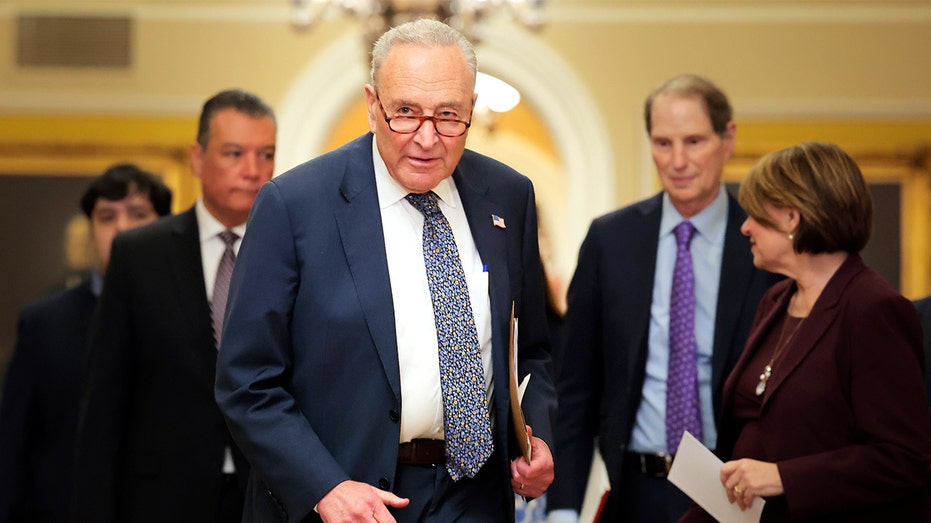Senate vote to end government shutdown ignites Democrat civil war

The eight critical votes that advanced a short-term spending package on Sunday evening and put the government on the path to re-opening also tore the seams of Democratic Party unity, bringing scrutiny to its shutdown strategy and leadership.
One of the eight said that the plan Democrats had rallied around at its outset had crumbled.
"After six weeks — going on seven weeks — that path wasn’t working," Sen. Angus King, I-Maine, said. "It wasn’t going to happen. The question was: Does the shutdown further the goal of achieving some needed support for the extension of the tax credits? Our judgment was that it will not produce that result."
"The evidence for that is almost seven weeks of fruitless attempts to make that happen. Would it change in a week? Or another week? Or after Thanksgiving? There’s no evidence that it would."
SHUTDOWN IGNITES STRATEGIST DEBATE: WILL TRUMP AND GOP PAY THE POLITICAL PRICE IN 2026?
To other Democrats, it’s the party’s top figures who led a losing effort.
"Senator Schumer is no longer effective and should be replaced. If you can’t lead the fight to stop healthcare premiums from skyrocketing for Americans, what will you fight for?" Rep. Ro Khanna, D-Calif, said in a post on social media on Sunday.
The government first plunged into a shutdown 40 days ago on Oct. 1 when Democrats rejected a short-term spending bill advanced by Republicans in the House meant to keep the government afloat until Nov. 21. Democrats had demanded that lawmakers first consider expiring COVID-era Obamacare subsidies set to phase out at the end of the year. Republicans, who saw spending and the tax credits as completely unrelated, refused to negotiate on the tax credits during the shutdown.
Ultimately, Republicans avoided any substantive concessions on the Obamacare credits.
The package advanced by the Senate on Sunday looks to reopen the government through Jan. 30, 2026, and also includes a bundle of three yearlong spending bills to fund Veterans Affairs, the country’s agriculture expenses and the legislative branch.
In return, Democrats who voted for the package secured the inclusion of language that prevents the Trump administration from conducting mass layoffs of federal workers through Jan. 30 and guarantees back pay for federal employees fired since the beginning of the shutdown. Additionally, they secured a stand-alone vote on the tax credit subsidies to be considered later this year, although that vote remains likely to fail without the needed Republican support.
To some Democrats, a failure to secure an extension — or even a partial extension — of the Obamacare subsidies was unacceptable.
GOVERNMENT SHUTS DOWN AFTER CONGRESS DEADLOCKS ON SPENDING DEAL
"I cannot support a deal that still leaves millions of Americans wondering how they are going to pay for their healthcare or whether they will be able to afford to get sick," Sen. Mark Warner, D-Va., said of the proposal.
"That’s not a deal. It’s an unconditional surrender that abandons the 24 million Americans whose healthcare premiums are about to double," Rep. Ritchie Torres, D-N.Y., said in a post on X.
But after 40 days of waiting, frustrations over the lack of an off-ramp didn’t just come from the senators who voted to advance the legislation.
"I just don’t get what the point is of delaying even longer," Sen. Elizabeth Warren, D-Mass., said moments after opposing the bill. "I want Republicans to grow a backbone and say, ‘Regardless of what Donald Trump says, we’re going to restore these cuts on healthcare,’ but it looks like I’ve lost that fight. So, I don’t want to impose more pain on people who are hungry and who haven’t been paid."
Sen. Chris Coons, D-Del., who pledged to vote against the package over its silence on Obamacare subsidies, said he understood the cracks in the party’s unity.
SPEAKER JOHNSON FLIPS SCRIPT ON DEM LEADERS WITH STAUNCH WARNING AGAINST GOVERNMENT SHUTDOWN
"On healthcare, I’d like to keep trying," Coons said. "But I understand, I respect my colleagues who are saying it’s time."
A final vote on the spending package is expected to take place in the Senate early this week. After that, it must clear the House of Representatives before it can become law and reopen the government.





